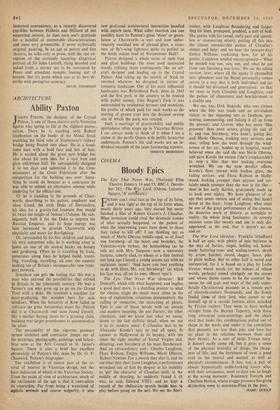CINEMA
Bloody Epics
The Epic That Never Was. (National Film Theatre, January 14 and 15; BBC-1, Decem- ber 24.)—The War Lord. (Odeon, Leicester Square, 'A' certitcate.) FICTION can't rival fact at the top of its form, and it was right at the top of its form when, nearly thirty years ago, they started but never finished a film of Robert Graves's I, Claudius. What invention could rival the dramatic ironies of what actually happened, or the pathos of what the intervening years have done to those they failed to kill off? I am thinking not so much of Merle Oberon middle-aged, as of Josef von Sternberg—of the boots and breeches, the Valentino-style turban, the hobnobbing (as he tells us) with Mrs. Simpson—now a university lecturer, soberly clad, to whom at a film festival not long ago I heard a young actress say with no malicious intent: 'And have you had anything to do with films, Mr. von Sternberg?' (at which his face was, all on its own, atinost 'epic').
The Epic That Never Was (director: Bill Duncalf), which tells what happened, and implies a good deal more, is a dazzling pointer to what the cinema might do much more often in the way of exploration, circuitous documentary, the culling of memories, the exorcising of ghosts. Epic is one of those words with an ancient and modern meaning, the one literary, the other cinematic, and we know just what we mean, down to the last stylistic detail, when we use it in its modern sense. I, Claudius was to be Alexander Korda's epic to end all epics, fit answer to Hollywood in its heyday, with ten times the right number of Vestal Virgins and; directing, von Sternberg at his most flamboyant. And an extraordinary cast: Charles Laughton, Flora Robson, Emlyn Williams, Merle Oberon, Robert Newton. For a month they shot it, and we see what they shot: from Laughton, a performance wrenched out of him by despair at his inability to 'get' the character of Claudius until, in the middle of shooting, he suddenly found it (it was, he said, Edward VIII's, and he kept a record of the abdication speech beside him to play before going on •the set). We see the film's rushes, with Laughton floundering and forget- ting his lines, prompted, prodded, a sort of bull- like genius with his round, curly pate and speech- less or stammering misery, putting all this into the almost unendurable pathos of Claudius's stutter and limp; and we hear the (present-day) Emlyn Williams explaining how, for all his genius, Laughton needed encouragement—'What he needed was sun, sun, sun, and what he got from von Sternberg was frost.' We see the edited version, later, where all the agony is channelled into splendour and the flayed personality comes across in a way that is both individual and (as it should be) distanced and generalised: so that we react to both Claudius and Laughton, and the pathos of clumsiness and bewilderment is a double one.
We see, too, Dirk Bogarde, who was sixteen when the film was made and an art-student visitor to the imposing sets at Denham, pre- senting, -.commenting, and linking it all up from the present; and Graves, who has more 'film presence' than most actors, giving his side of it, and von Sternberg, who hasn't, giving his; and Merle Oberon, looking very nervous and nice, telling how she went through the wind- screen of her car, landed up in hospital, wasn't believed when she said she was Merle Oberon, and gave Korda the excuse (`she's irreplaceable') to stop a film that was making everyone wretched. We see the now derelict offices, Korda's floor strewn with broken glass, the fading notices; and Flora Robson in Holly- wood, looking younger than anyone and cer- tainly much younger than she was in the film— then in her early thirties, gruesomely made up to look over eighty. We have glimpses of an age that seems remote and of acting that hasn't dated in the least: from Laughton, what -must be one of the great performances of the cinema. As detective work or history, as nostalgia or reality, the whole thing fascinates: its seventy minutes seem like twenty and one is only dis- appointed; at the end, that it doesn't go on and on.
The War Lord (director : Franklin Schaffner) is half an epic, with plenty of epic business in the way of battles, sieges, boiling oil, home- made battering-rams and scaling-towers, death by arrow, hatchet,, sword, dagger, lance, pike or plain wallop. But its other half is weird and unexpected, for it is based on a play by Leslie Stevens whose words (or the echoes of whose words, perhaps) sound strangely on the screen and whose theme seems to be the contrast be- tween the old gods and ways of the only super- ficially Christianised peasants in a remote part of eleventh-century Normandy, and the firmly feudal ideas of their lord, who comes to set himself up in a seaside fortress often attacked by Frisian raiders. They seem to have walked straight from the Bayeux Tapestry, with those long armoured nose-coverings and the chain mail that looks like combinations pulled out of shape in the wash; and under it the conviction that peasants are less than pigs and love has no place in the relations between them and their betters. As a sort of twilit Tristan story, it doesn't really come off, but it gives a sense of the physical brutality of things, the cheap- ness of life, and the harshness of even a good man in the (moral and mental, as well as physical) circumstances. It has, too, a pair of almost hypnotically noble-looking lovers who, with their seriousness, seem to dare one to laugh at the wrong moment: Rosemary Forsyth and Charlton Heston, whose craggy presence has given distinction even to nonsense-films In the past.
ISABEL QUIbLY






























 Previous page
Previous page